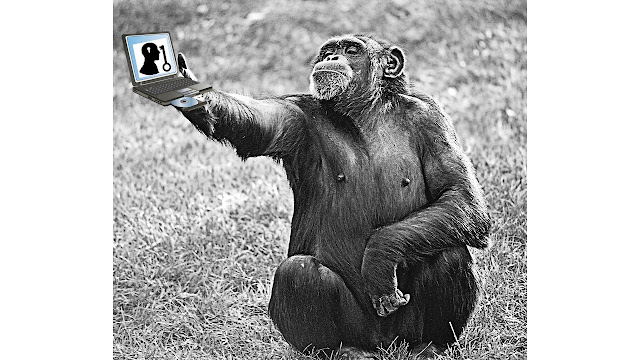The digital version of me - maybe a better one?
Digital literacy is not one single skill, but rather a whole bunch of them. Lucky me! They could be described in various ways and every inventory ends up with a different number of literacies (JICS, Belshaw) so it is not that obvious how to talk about them or describe them. I chose to go with the set of seven literacies described by the JICS. I mapped all literacies in a chart ranging from 0 (no skill what so ever) to 10 (complete expert) and then tried to map myself on to it all. This was quite good, because I lack confidence in my digital skills. Separating into different aspects showed me that I’m not a total lost case in all aspects, just a few, and I do have some strengths as well. As a consequence, it also became clear what I need to improve.

About me and the digital world; as a rule of thumb, I like to reveal as little about myself on the internet as possible (which could hamper the development of digital skills). For that reason, I refrain of using social media and I don’t like posting pictures of myself or write about myself. You never know who is lurking about at the internet…(Luerweg, 2019).This also shows in the more ‘professional’ social media tools such as Linked In and ResearchGate where I am extremely bad at marketing myself. There is a resistance against social media in my private life and so it follows that I don't use it very effectively in my worklife either.
This fear of mine is not only restricted to text information, but also pictures. Anyway, as a compromise I took some time during this Topic to create an Avatar of myself to use (https://avachara.com/avatar/). I do believe that pictures of the persons you interact with is making it more personal and easier to actually engage, so maybe avatars could do the trick for me? Another part of developing digital skills is to actually have the courage to try different tools or programs (outside the LMS of the university). Since I’m not the bravest person walking the earth I revisited Prezi, which I used several years ago in a course. So it’s kind of halfway new. This time I experimented with the minutes from a meeting and instead of serving the colleagues the usual Word.docx, they got a Prezi. For me it feels safer to test new ideas on my colleagues, and get some feed-back, before trying to use a tool in the teaching situation. That is also the great advantage of this ONL course; trying out new tools in a situation that is ‘safe’. In our group presentation we show three different types of teachers in the digital age, and I would describe myself as the middle one, anticipating (to involve e-learning technologies). Maybe next I will try to use social media more, maybe I can find a balance between the private person and the professional that is visible on the net?
Digging deeper into this endless maze of skills, tools and digital spaces, we all got the assignment of David White to plot our digital activities in the Resident-Visitor/Institutional-Personal map. The map provide a kind of overview of who you are on the internet. However, I lack the timeline. I wish to see how different kind of tool-usage varies over time and when I started using them. So I have also spent a ridiculous amount of time trying to create a new graphic, that is 3D and also capture time. I did not succeed!
So, please you very skilled people in this course, give me a tip of how to create a 3D graphic of the Resident-Visitor model that looks professional and not like something made of a desperate teacher in an online learning course.
Anyway, you don’t become an expert overnight. So, at this stage I have started to explore what’s out there and think about how to use these tools in my teaching. Do they provide extra value to my courses? Are the assignments meaningful? Do they enriched the learning?
Until the next time
/Amanda
References
Belshaw, D. The essential elements of digital literacies. TEDxWarwick
JISC. (2014) Developing digital literacies. http://web.archive.org/web/20141011143516/http://www.jiscinfonet.ac.uk/infokits/digital-literacies/
Luerweg, F. (2019). The internet knows you better than your spouse does. https://www.scientificamerican.com/article/the-internet-knows-you-better-than-your-spouse-does/
White D. Visitors and Residents (video)



I absolutly agree with you Amanda, when it comes to staying professional and reflecting on what I share and not for example on social media. I find social media very fruitful for me both as a occupational therapist and teacher in relation to that on social media there is a lot of good information linked to the profession in the form of debate articles and tips from professionals in the clinics. Then I became curious about how you did and what tool you used to map your digiyal litracy?
SvaraRaderaMe and my colleagues also reason that it is good if together in the college we can test a tool and evaluate if we should use it, what is the benefit of it and what does it give extra in the students' learning and their knowledge and skills.
Good luck with you course and your teaching
I created the map in Power Point. But I Think you can use Excel as well, depending on which of the programs that you are more comfortable with.
RaderaNice reflection, thanks Amanda! I think it is understandable to protect our real identity (whatever it may be). However, I consider this course as a safe environment to try out different things and see if those make sense. It is like a video game, where you might lose your life, but start again with better skills. I also encourage my students to bravely try out new things on my courses. If they fail, it is not as serious as failing in real working life. See you soon online, Matti
SvaraRadera